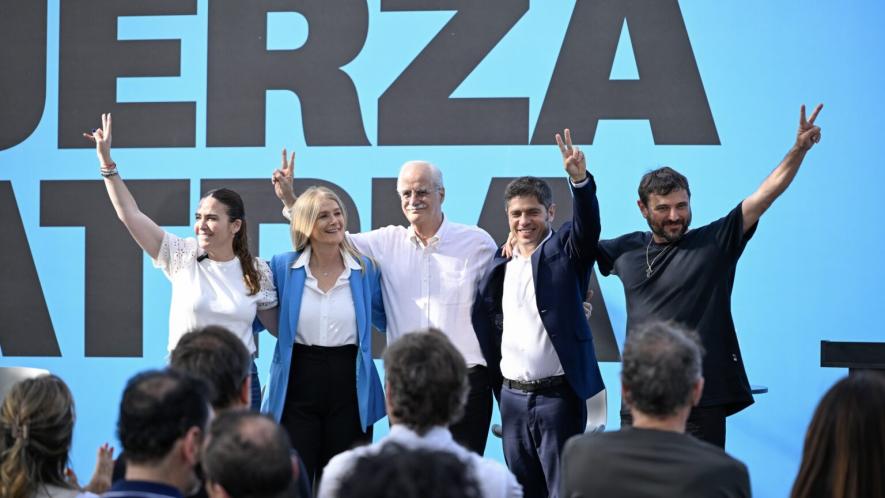Argentina Heads to Polls Under Shadow of Trump Bailout, Threats

Peronist Fuerza Patria rally. Photo: Axel Kicilof / X
On Sunday, October 26, Argentina will go to the polls to renew part of its legislature. Half of the Chamber of Deputies and a third of the Senate will be voted on in the elections, so the day will define a large part of the political composition of the South American country.
Javier Milei, Argentina’s far-right president, hopes that these elections will overcome the popularity crisis revealed by the September 7 elections in the province of Buenos Aires. In those elections, the ruling party, La Libertad Avanza (LLA), suffered a crushing defeat at the hands of its arch-enemy, Peronism, which Milei has accused of boycotting his administration.
In fact, in a recent interview, Milei directly accused Peronism of boycotting the fiscal adjustment by drafting laws that sanction increased spending to address social issues, public programs, increased benefits for vulnerable social groups, etc.
In this sense, the legislative elections are of cardinal importance for Milei’s neoliberal project, which aims to reduce the state to its bare minimum, at the expense of eliminating the social benefits that have traditionally been maintained by the Argentine political structure.
However, two consecutive defeats could also herald a debacle that the president himself wants to avoid at all costs. In the absence of dollars, as a result of the recent economic crisis in Argentina, the Trump administration has undertaken a financial bailout to prevent the Argentine economy from collapsing. In addition, the US president announced that future aid will be conditional on who wins the October 26 elections. Trump said, “If a socialist wins, there will be no more aid.”
A close election campaign
Polls seem to indicate that the contest between Peronism and LLA will be close. Rubikon Intel stated that the ruling party has a slight lead (34.6%) over its main opponent (32.2%). Likewise, Management & Fit gives Milei’s libertarian party 39.6%, while Peronism, grouped under Fuerza Patria (FP), would reach 34%.
However, there are other polls that could cause concern in the Casa Rosada. According to Zentrix, FP would reach 43.5%, while Milei’s party would barely reach 36.5%. The pollster Trespuntozero agrees with this assessment, giving Peronism a six-point lead over the ultra-liberal right (46.2% vs. 40%).
Why has Milei’s popularity declined so sharply?
While the polls exhibit differences in their final numbers, they do clearly show a decline in Milei’s popularity, which is at its lowest level since he took office. Belén del Huerto, a feminist journalist with El Grito del Sur spoke to Peoples Dispatch about Milei’s popularity crisis and what is driving it. For del Huerto, the decline in popularity is largely to the various scandals that have plagued the government. “Among them is the Libra Scandal, which defrauded many people, as well as the link between José Luis Espert and drug trafficking. Added to this is Milei’s submission to Donald Trump’s government through the purchase of Argentine pesos in exchange for dollars, which implies the terrible intervention of the US market in the Argentine market.”
Del Huerto also believes that the current economic crisis could lead to Milei’s defeat in the upcoming elections. “Despite the injection of dollars from the US government, this is not noticeable in the Argentine economy, where purchasing power is steadily declining. The drop in consumption of meat and other foods is dramatic.”
If Milei loses the elections, it could exacerbate the crisis of governance, she added. “According to several sources, Milei’s allies in the legislature would ask him for a governance pact if he loses.”
Governance pacts are a common practice in Latin America and throughout the world, when a president lacks a legislative majority. They typically involve making concessions to the opposition, repealing unpopular reforms, or moderating rhetoric to avoid a major political crisis and keep the government functioning.
“This shows that Milei’s governance is fragile.”
Del Huerto also points out that Peronism must be able to attract the popular sectors again so that they can resume their project with force: “Peronism must generate a proposal that will win back the popular classes. It needs a political program so that Argentines do not become disenchanted with politics, because what usually happens when a government fails, as is currently the case, is that people become disenchanted with politics.”
Courtesy: Peoples Dispatch
Get the latest reports & analysis with people's perspective on Protests, movements & deep analytical videos, discussions of the current affairs in your Telegram app. Subscribe to NewsClick's Telegram channel & get Real-Time updates on stories, as they get published on our website.
























